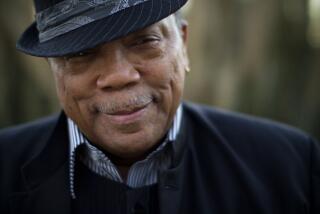Videotape Farewell: ‘I’m a Dead Man’
- Share via
Daniel V. Jones, the 40-year-old Long Beach man who killed himself on live television while making a statement about HMOs, left a videotaped message explaining his motivations and laying blame for his suicide, Los Angeles police said Friday.
As friends and relatives grieved Friday for Jones, describing him as proud, passionate and willing to take his life--and his beloved dog’s--to prove a point, police said they found a videotaped “suicide note.”
In it, the HIV-positive Jones, sitting on a couch next to his dog, a 7-year-old Labrador-whippet mix named Gladdis, says: “I’m not going to fight the disease. It has affected my neurological system. I’m not going to end up crazy.”
A police source who viewed the video said that Jones--wearing shorts and a pullover shirt--complains that he’s in pain and says, “I’m a dead man,” and signs off by declaring, “See ya!”
“It was definitely a goodbye tape,” the source said.
The video was filmed Wednesday, the day before Jones shot himself to death. It was not addressed to anyone. In the tape, Jones does identify a doctor but not an HMO.
Asked about the video, Police Lt. Anthony Alba declined to provide more details. He said police are concerned that those identified in the tape might be at risk from someone else harboring a grudge.
“He was a desperate man who just gave up on life,” Alba said.
Jones, a maintenance worker at a Long Beach hotel, shot himself Thursday afternoon in one of the most dramatic and graphic incidents ever witnessed by a live television audience.
The suicide, high atop the interchange of the Harbor and Century freeways in South-Central Los Angeles, tied up rush-hour traffic well into Thursday night.
It also shocked television viewers and sparked a debate over the ethics of broadcasting unfolding events live, particularly because some stations interrupted children’s programming to go live to the scene.
As news helicopters swarmed overhead, Jones parked his truck shortly after 3 Thursday afternoon on the high-rise connector loop from the Harbor Freeway to the Century Freeway.
He called 911, reached the California Highway Patrol and rambled on about HMOs, according to the LAPD. Law enforcement agencies declined Friday to provide an audiotape copy of the recorded 911 call.
During the call, Jones fired several rounds from the shotgun, one of them through the roof of the truck, police said.
Jones pulled out a knapsack and displayed what appeared to be some clothing and a videotape before throwing everything over the freeway wall. That tape contains the “suicide note,” police said Friday.
Jones then walked onto the empty freeway and unfurled a banner that read, “HMO’s are in it for the money!! Live free, love safe or die.” He made a few obscene gestures, returned to the truck and petted Gladdis.
Suddenly, the truck burst into flames. Jones fled the truck with his hair and some clothing on fire. Gladdis was left behind.
Writhing in pain, Jones rolled on the ground and tore off his burning pants and underwear. He climbed onto the freeway wall as if to jump--but didn’t.
Instead, he stepped down, returned to the flaming truck, grabbed his shotgun, walked to the other side of the road, placed the gun under his chin and pulled the trigger.
Jones’ sister, Janet, 38, told Associated Press that her brother was a passionate man who had had a bad experience with a health maintenance organization about 10 years ago.
“My brother was almost killed by an HMO,” she said. “He went to an HMO complaining of severe pain in his side and other flu-like symptoms. He was sent home. His appendix burst.”
It remained unclear Friday which HMO plan--or plans--Jones had used.
Within the last week, Jones had been found to have cancer, a friend said. The friend, who spoke on condition of anonymity, also said Jones believed he was getting the runaround from his health insurer.
Meanwhile, Janet Jones told Associated Press that it was only at the time of the suicide that her brother’s best friend told her Jones was HIV-positive.
Janet Jones declined Friday to come to the door of her Thousand Oaks home. Instead, a family spokeswoman, Marie Hamilton, emerged from the house to say that Janet Jones, brother Michael and mother Joan wanted time to mourn before discussing the specifics of Daniel Jones’ life--and death.
“I think the time for them to be specific is when they speak through their counsel,” Hamilton said. “They’re seeking advice from legal professionals. Once they get advice from counsel on what’s appropriate to say, they’ll make a statement. They’re grieving right now.”
At Joan Jones’ Torrance home, another relative, Ann Jones, answered the door. She said of Daniel Jones: “He was a delightful man. He was a joy to be around. But he had AIDS and his HMO wouldn’t help him.” She declined to elaborate.
Jones was described Friday by friends as a constant smoker, avid golfer and beach-goer whose blond hair and tanned body gave him the look of a California surfer.
“He laughed easily. He loved easily. He cared about animals,” Hamilton said.
Repeatedly, friends noted Jones’ kinship with Gladdis.
“A real sweet dog,” said Sandra Rogers, 56, the manager of the MarineLand mobile home park in Hermosa Beach, where Jones lived in 1996.
Asked if she was surprised that he allowed the dog to burn to death, Hamilton said softly, “Of course.”
In Long Beach, police boarded up the windows of Jones’ tiny Long Beach bungalow, hoping to keep away curiosity seekers and vandals. Inside, officers continued their investigation.
Neighbors seemed stunned that Jones, described invariably as a “nice and polite” man, took his life in such dramatic fashion.
“I was shocked,” said Tina Milona, whose house is a few doors from Jones’ residence. “He didn’t seem a threat to society.”
“You never know what lurks in people’s minds,” said Frankie Segal, a limo driver whose garage faced Jones’ garage. “Everyone has his dark secrets.”
In mid-February, Segal recalled, he arrived home about midnight and saw a sad Jones standing outside. Asked what was wrong, Segal said Jones replied: “I’m not doing very well. I’m angry with my health insurance.”
Bill O’Connell, whose back door opens onto Jones’ frontyard, frequently took care of Gladdis; in exchange, Jones would often take care of O’Connell’s three dogs. O’Connell said he and Jones talked Wednesday night and nothing seemed out of the ordinary--the conversation centered around flea medicine for the animals.
But another neighbor, Armando, who asked that his last name not be used, said Jones seemed disturbed Thursday just a few hours before he got into his truck and headed for the freeway overpass.
“I said ‘hi’ to him, but he didn’t act normal,” Armando said. “He had his head down and his shoulders scrunched. I thought there was something wrong with him.”
Times staff writers Carla Hall, Jean Merl, Hector Tobar and correspondent Deborah Belgum contributed to this story.
* HOWARD ROSENBERG: Television stations finally get what they want. F1
* A WAKE-UP CALL? News directors say they will still show chases. A19
More to Read
Sign up for Essential California
The most important California stories and recommendations in your inbox every morning.
You may occasionally receive promotional content from the Los Angeles Times.













